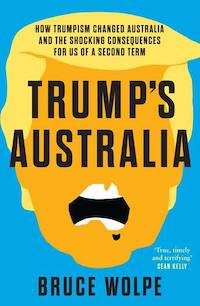Politics
Our newly-minted National Anti-Corruption Commission – a change in political culture?
Monday was the first formal working day of the National Anti-Corruption Commission. (The commissioner and staff have actually been working behind the scenes for months to make sure the NACC is fully ready to start exercising its formal duties.)
You can see a video of Commissioner Brereton’s opening address in which he spells out the NACC’s purpose and functions. (The recording is blank up to 17 minutes, and from then until about 23 minutes Brereton is occupied with formalities.)
You get a strong feeling for the significance of the NACC’s establishment in Brereton’s statement:
The people of the Commonwealth are no longer prepared to tolerate practices which might once have been the subject of, if not acceptance, at least acquiescence.
He’s referring to people’s hope not only for an investigatory agency, but more broadly for a changed culture and a restoration of people’s trust in government. “Corruption erodes public trust in government and the institutions of state, and undermines democracy” he states.
His speech outlines the Commission’s wide powers, and its work in improving and upholding the integrity of the public sector. “Integrity involves making decisions and giving advice honestly and impartially on the evidence and the merits, in the public interest”.
We may imagine corruption involving shopping bags stuffed with high-denomination banknotes exchanged in dark alleyways, but the definition of corruption guiding the NACC, is posted on the Attorney-General’s Department website:
Any person who does something that causes or could cause a public official to behave dishonestly or show bias in the exercise of their official functions, powers or duties, could be engaging in corrupt conduct.
Importantly Brereton stresses that conduct can be corrupt without necessarily being criminal, a distinction many have not understood in the case of the New South Wales ICAC finding against former Premier Gladys Berejiklian.
Adam Graycar, now of the University of Adelaide, writes in The Conversation about the significance of the New South Wales ICAC findings and the establishment of the NACC: “Grave misconduct”: Gladys Berejiklian corruption report should put all public officials on notice. “We have started on an integrity-building process in the Australian public service and around the country”.
The ABC’s Matthew Doran has a post on the NACC’s work: More than 40 corruption referrals already made as National Anti-Corruption Commission commences, with speculation about what cases it may pursue. In this regard it is notable that in his address Brereton stressed that the Commission is more concerned with current cases than with those that have come to attention in the past.
Writing in The Conversation A J Brown of Griffith University, a member of the Transparency International board, explains how the Commission will work, and discusses some of the cases that may come to its attention, including alleged abuse of public office by retiring Coalition frontbencher Stuart Robert, and PwC’s conduct, the latter being on the edge of the Commission’s remit – either just in or just out: The new National Anti-Corruption Commission faces high expectations – and a potential mountain of work.
What another Trump presidency would mean for Australia
How would Australia fare if Trump were elected president?
The presidential election will take place on Tuesday November 5 next year, and the presidential inauguration will be on January 20, 2025.
That threat is real, but it is hard to quantify. In Australia we have frequent polling about people’s choice between “the government” and “the opposition”, and those polls generally get it right. Polling in the US is far less reliable. Until the primaries are held we don’t know who the Republican candidate will be, voting is not compulsory, and the electoral college system provides a “winner take all” outcome for each state. One large state such as Florida, teetering around 50:50, can deliver a decisive swagful of college votes to one candidate or the other. It is therefore easy for a candidate to win office with far less than 50 percent of the vote – as Trump did in 2016.

Because the latest polling, such as the fivethirtyeight poll, shows Trump holding a comfortable lead in the Republican primaries, a Biden-Trump contest looks increasingly likely. The latest Morning Consult poll shows Trump enjoying a three percent lead over Biden (44 percent to 41 percent) in a hypothetical Biden-Trump contest.
On Late Night Live political analyst Bruce Wolpe discusses the dangers for Australia of a second Trump presidency. (26 minutes). Much of the discussion is about Trump’s political tactics, honed and improved since he was first elected in 2016.
His policies on immigration (put up a wall) and on energy (climate change is fake news) would have worldwide consequences. In relation to Australia we would bear the trade and security consequences of his “America first” isolationism. We might recall his rudeness to Prime Minister Turnbull in a discussion on asylum-seeker policy when Trump was in office.
Wolpe believes that Foreign Minister Wong has the possibility of Trump isolationism on her mind, as she strengthens our trade and political relations in our own region.
The biggest threat to Australia and the world is that Trump would continue the task he hardly started in 2017 – the destruction of US democracy. It’s sobering to consider the repercussions that would have on younger, less-established democracies, and the encouragement that would give not only to thugs like Putin, but also locally to our extremist political movements, and to some in the far-right fringe of the National and Liberal parties. The Liberal Party is already heavily infiltrated by movements from the so-called “Christian” right.
Wolpe is a Fellow at the United States Study Centre at the University of Sydney, and author of Trump’s Australia: How Trumpism changed Australia and the shocking consequences for us of a second term.